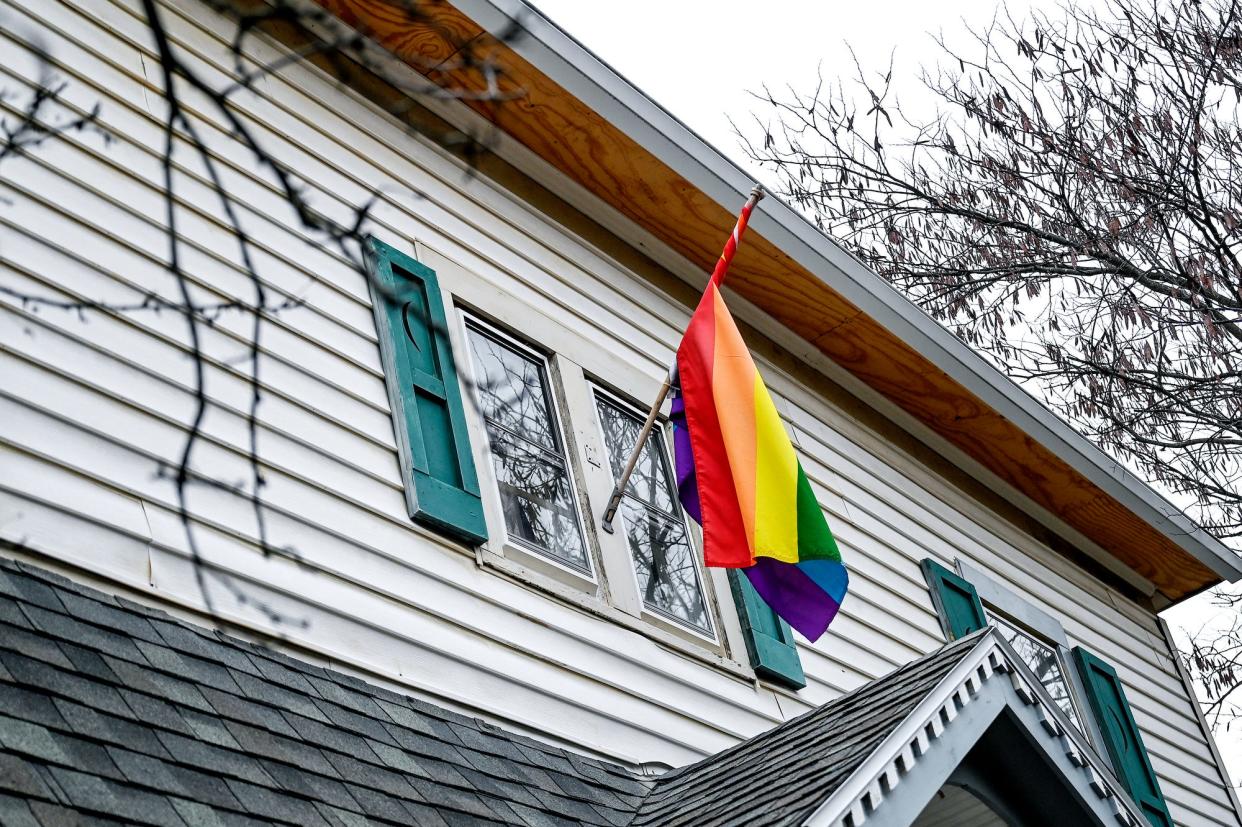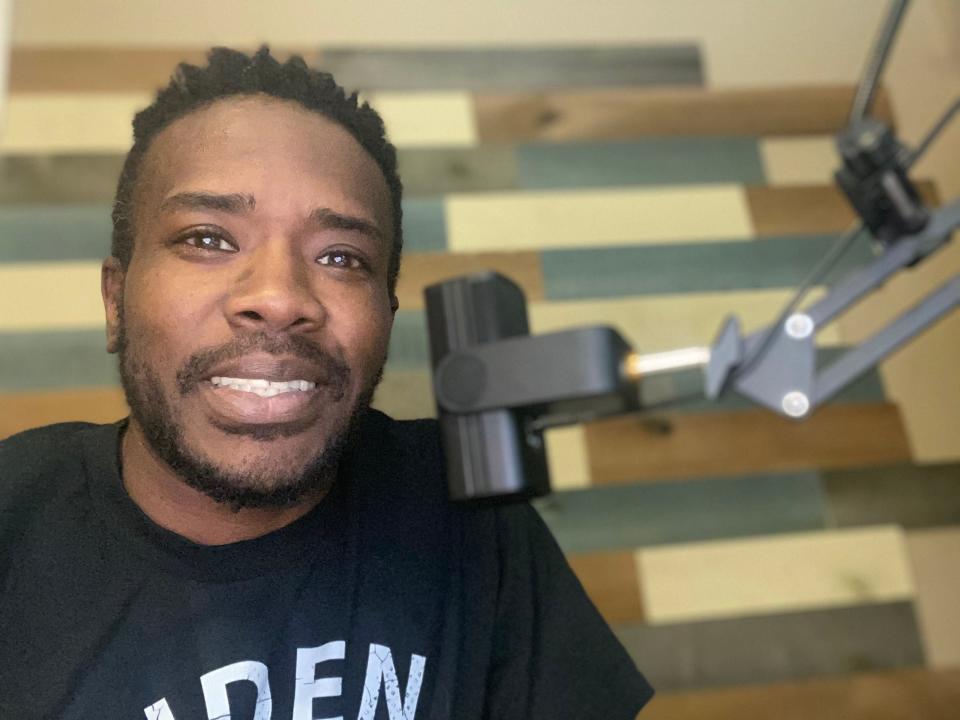Is it safe to be out and trans in Michigan?

- Oops!Something went wrong.Please try again later.
LANSING — A record number of anti-transgender bills in legislatures across the U.S. this year includes bills in Michigan that would make it a felony for medical professionals to provide puberty blockers and gender reassignment surgeries for anyone under 18.
Unlike Missouri and Florida, where legislation regulating medical treatment for the transgender community has been voted into law, Michigan is expected to be less receptive with a Legislature and governor's office controlled by Democrats.
The legislation has, however, further exposed the political rift between progressives and conservatives that is playing out in communities across the state.
In her own words: Dylan Mulvaney breaks silence on Bud Light backlash: 'Dehumanization has never fixed anything'
Trans man and activist Layne Ingram of Lansing said Michigan's bills are based on ignorance and fear. He said he feels safe as an out trans man in Michigan but acknowledges that the issue does raise safety concerns for some members of the trans community and creates personal challenges. He said it took him months to secure an appointment with a doctor who accepted his insurance to undergo gender reassignment surgery.
"I was at a bar in the U.P. last weekend and I said, 'Hey, can I get a Bud Light,' and they said 'We don't have that,'" Ingram said. "I've gotten a Bud Light here many times and they were like 'we don't have that anymore,' and I understood what they were trying to say."
He said the exchange let him know the bar wasn't safe for him if conversations about trans people or the larger LGBTQ+ community come up. In the past few months, conservatives have attacked Bud Light and its parent company, Anheuser-Busch, over partnering with trans influencer Dylan Mulvaney for branded social media posts.
Some people told the State Journal they generally find Michigan a welcoming place for the LGBTQ+ community, although less so for people of color in that community.
So how safe is Michigan?

'Children cannot consent'
Jamie Ashby is a trans woman who lived in Texas and Florida before moving back to Michigan recently. She's become an advocate for other trans people through her own work and representing Michigan at the Miss Trans USA pageant.
She firmly believes Michigan is a safe space to be because of Gov. Gretchen Whitmer.
"If something were to happen to me or were to happen to one of my trans brothers or sisters, I know that it would be dealt with accordingly," she said. "And I think that with how resilient she is and how visible she is in our communities, that people would think twice before trying to do something that would harm us."
Under Whitmer's administration, the state has made significant updates to better serve trans and genderfluid people. Secretary of State Jocelyn Benson changed the department's policy in November 2021 to allow for the "X" gender indicator on state IDs and driver's licenses. That same year, Attorney General Dana Nessel said a state law that required trans residents to undergo sex-reassignment surgery before changing their gender on legal documents is likely unconstitutional.
The Michigan Supreme Court ruled in July 2022 that the Elliott-Larsen Civil Rights Act bans discrimination based on sexual orientation and gender identity. Whitmer signed legislation in March further codifying LGBTQ+ rights within the law. It goes into effect 90 days after the 2023 legislative session ends.
Rep. Emily Dievendorf, D-Lansing, doesn't believe the state is safe enough. She's the state's only openly nonbinary lawmaker. She said she had to scale back her outreach efforts in the months after she was elected because of death threats.
"I've been bombarded by emails, by messages on social media, that allude to threats, that are threats that tell me I shouldn't exist," Dievendorf said. "I have one message that said my mother should have re-consumed me in the womb. Another one said they would seize on the chance to break my face."
More: Planned Parenthood of Lansing, Marquette offering barrier-free hormone therapies
There are 556 anti-trans bills that have been introduced in every state except Delaware in 2023, according to Trans Legislation Tracker, an open-source website that tracks anti-trans legislation. Some 80 of those bills have passed with 372 still active; 104 have failed. The website said 2023 has been a record year in anti-trans legislation, smashing 2022's record-breaking 174 bills.
Politicians introduced bills to block trans students from playing in sports, silence LGBTQ+ teachers and students, define "man" and "woman," and block gender-affirming care.
Some laws are being struck down in the courts. U.S. District Court Judge Robert Hinkle axed Florida's ban on care for transgender youth Tuesday, saying the ban would've caused "irreparable harm" to children if they don't receive hormonal blockers and boosters.
Michigan State House Rep. Brad Paquettte, R-Niles, introduced Michigan's two bills on May 9. House Bill 4539 would make it a crime for medical professionals to provide puberty blockers and gender reassignment surgeries for anyone under 18. House Bill 4540 would classify such a crime as a felony, punishable by up to four years in prison.
Paquette disagreed with his legislation being characterized as an attack on trans people and the larger LGBTQ+ community. He said "children cannot consent" to the medical treatments and his bills are to protect children.
He wants to have more conversations about the "side effects" of medically transitioning and said the science isn't settled.
"There are a large group of people talking about how they have many bone issues after this and so I'd be curious as to who those individuals are and then having very open and honest dialogue about it," he said.
"If anyone wants to look at the post-op photos of what the end results are of these individuals who are being misled to believe that they can be genuinely a participant of the opposite sex, that these cosmetic surgeries do not fix the deep down issues, especially when you're talking about young people in the (uncomfortable) phase of puberty," he said.

'It's not harming anyone'
The bills could directly affect East Lansing siblings Newt and Ellie Wheeler, and their medical team. Newt is 14 and trans, and he takes puberty blockers. Ellie is 20 and a trans woman; she takes testosterone blockers and estrogen.
"It's not harming anyone," Newt said. "People being in their own bodies and safety in their bodies isn't affecting anyone but that one person. It's to be comfortable."
Their mom, Karessa Wheeler, said lawmakers don't understand the trans community or how medical care is determined.
"This trend of denying medical care to children, their dad and I feel strongly for, that it's to keep them the healthiest mentally and physically," she said. "Our children are receiving age-appropriate care."
Ingram said gender-affirming care is necessary for trans youth. He said it would improve their mental and physical health and they wouldn't have an internal struggle with being in "the wrong body."

What would make the state safer?
People from Florida, Texas, Ohio and Kentucky have relocated to Michigan because of its trans-friendly legislation, Dievendorf said. She wants to make the state a sanctuary for someone to receive gender-affirming care, update Michigan's Ethnic Intimidation law to include gender identity and ban conversion therapy, among other things.
"I get letters from across the country asking how soon we're going to pass trans refuge legislation and whether they can find sanctuary here in Michigan when people are being persecuted, or when youth are in positions to not be accepted by their families out of state," she said.
Lilianna Reyes, executive director of Trans Sistas of Color Project in Highland Park, said more needs to be done to protect trans people of color.
"I feel safe sometimes but not as a person of color," she said. "I say that because people will feel safe in Royal Oak or Ferndale and they're white. I don't feel safe in certain spaces as a trans woman of color."

Reyes, who is Mexican and trans, said the state would be safer once organizations decentralize whiteness and have conversations about race and how it intersects with the LGBTQ+ community.
She has fought for organizations to rethink how they serve trans people and to include those who are experiencing homelessness and to place trans people of color in positions of power to capture the whole community.
"Sometimes when you think about safety, you think about violence," Reyes said. "Many organizations are too far in suburbs where people of color don't feel comfortable as they're being watched."
Drag performer Aaliyah Tealheart Paradisco is nonbinary and said they haven't felt unsafe in the cities in Michigan in which they've lived. But they worry about their trans friends.
From 2015: Transgender slaying outrage: 'Our lives are treated as disposable'
"I’m also not an easy person to shake," they said. "I’m not saying safety is not an issue because I certainly know plenty of my trans brothers and sisters that are concerned to go about their daily lives."
Still today, Reyes said trans people of color are getting harmed or killed for their identity and there's not as much attention paid to them as is with white trans people.
Natasha Kieanna's body was found in a car on Detroit's west side in 2021. The trans woman had previously been reported missing. Detroit Police are still investigating her death. A trans woman also filed a lawsuit against the state Department of Corrections in 2021 alleging she was forced to bunk with a convicted rapist and was later raped.
The Detroit Free Press reported in 2015 trans Detroiters and activists felt their lives were disposable after someone shot and killed Amber Monroe and a Wayne County Medical Examiner incorrectly identified Monroe by her former, male name.

Ingram said his focus is on empowering trans youth and helping them navigate through today's society in the midst of anti-trans legislation and rhetoric.
"This is Pride Month and while they're attacking us, thing is you can't take my joy," Ingram said. "You can't take who I am. And that's what I try to tell kids when I talk to them. You are you, you are special. You are unique, you are perfect and nobody can take that from you."
Support local journalism and get unlimited digital access! Subscribe for only $1 for three months!
Contact reporter Krystal Nurse at 517-267-1344 or knurse@lsj.com. Follow her on Twitter @KrystalRNurse.
This article originally appeared on Lansing State Journal: Do transgender Michiganders feel safe in the state?

